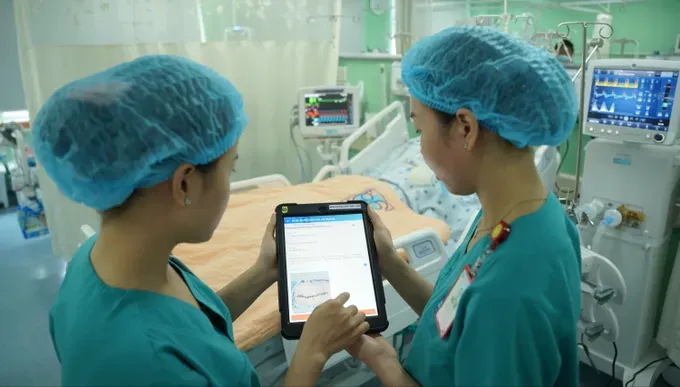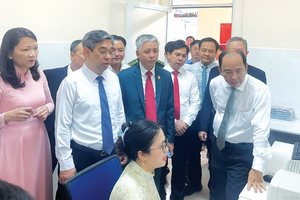
Despite the rapid advancement of digital transformation across Vietnam, the nationwide push for Electronic Medical Records (EMRs) is, according to numerous experts, encountering significant headwinds, particularly at the local level.
These hurdles aren’t just technical. According to Director Nguyen Ngo Quang of the Ministry of Health’s Department of Science, Technology and Training, the challenges stem as much from the mindset of hospital leadership and the IT proficiency of medical staff as they do from infrastructure and inconsistent financial mechanisms.
For a mid-sized facility, the road to a paperless system is paved with substantial costs. It is a massive undertaking that demands heavy investment in everything from software and data storage to workstations, digital signatures, and robust network systems.
And that’s before factoring in the ongoing expenses for staff training, software maintenance, and daily operations. For hospitals that are financially autonomous, mobilizing the necessary capital for these upgrades presents a formidable challenge.
This sentiment is echoed by leaders at many other hospitals. They acknowledge that while they have had medical information systems for years, they haven’t met the technical and legal prerequisites to officially go paperless.
This is a common story when their IT systems are outdated and can’t handle the ballooning data loads, and their IT teams, often lacking specific experience in the medical field, struggle to keep pace with the complex implementation schedule.
Adding another layer of complexity, many senior doctors aren’t accustomed to reading patient files on a computer screen, creating a cultural barrier to adoption.
Furthermore, the procurement process itself is a bureaucratic maze. Hospitals must put out bids for EMR equipment and software, but with no official technical-economic guidelines to establish a baseline price, determining a fair value is incredibly difficult. For financially independent hospitals already stretched thin, the enormous cost of EMR implementation can feel like a mountain too high to climb.
Learning on the fly
Some hospitals, however, are forging ahead, adopting a “learn as you go” philosophy, MD Vo Ngoc Loi, Head of the General Planning Department at Ba Ria – Vung Tau Eye Hospital in HCMC, noted that his facility began piloting EMRs on July 1. The plan is to iron out the kinks on the fly and prepare for a full, official launch on September 1.
“We’re constantly refining the system”, he explained. The hospital is also partnering with a telecom company for e-prescriptions and linking with social security and police databases to integrate health data directly into the national VNeID digital identity app.
The hospital has successfully met the basic criteria for EMR implementation and is reportedly continuing to invest in upgrading its data storage and server systems to maximize efficiency.

The potential rewards are immense, as proven by Bach Mai Hospital, a premier national medical institution. After rolling out EMRs in November 2024, the hospital now saves approximately VND100 billion (US$4 million) annually by eliminating printed films and paper records.
According to its director, Assoc Prof Dao Xuan Co, PhD MD, the system also minimizes handwriting errors and gives doctors instant access to patient histories, enabling faster, more accurate diagnoses for its thousands of daily patients, showcasing the incredible cost-saving power of digitalization in healthcare.
The story is similar at HCMC Children’s Hospital. Its deputy director Nguyen Minh Triet shared that his facility began its EMR journey in June 2023 and officially “killed off” paper records by October 2024. Now, instead of carrying a paper booklet, patients are issued a single QR code for their entire visit. The benefits are clear for the hospital’s bottom line, too.
“We used to spend about VND2 billion ($80,000) on paper every year”, Deputy Director Tien noted. “Now, with EMRs, that cost is gone, and patient data is securely stored in three separate locations, ensuring it’s never lost.”
Beyond the savings, EMR data represents a goldmine for medical research, potentially accelerating the development of new and more effective treatments. A widespread digital shift also paves the way for advanced applications of artificial intelligence (AI) and the Internet of Things (IoT), promising revolutionary breakthroughs in diagnostics. Yet, despite this promise, adoption remains sluggish.
According to Director Do Truong Duy of the National Health Information Center, as of late July 2025, a mere 270 hospitals – just 7.5 percent of the nation’s 1,800+ healthcare facilities – have successfully replaced paper with EMRs. It’s a figure that falls far short of the Government’s ambitious goals.
Deputy Minister of Health Nguyen Tri Thuc stated that EMR implementation is the sector’s foremost priority. Agency and unit heads are fully responsible for this, for prioritizing resources, and for mobilizing support from organizations and the public.
It must be decisive to ensure quality and meet the September 2025 deadline laid out in the Prime Minister’s Directive No. 07. This transition has to be substantive – it must deliver concrete efficiencies, improve healthcare quality, and provide real benefits to citizens and facilities, all while guaranteeing complete data security.
President Tran Quy Tuong of the Vietnam Medical Informatics Association proposed that to truly succeed with EMRs, it’s not just about technology but about restructuring the professional workflows and cultivate a data-driven mindset among all medical staff.
At the same time, the Ministry of Health needs to maintain its assertive guidance and, frankly, impose penalties on localities that fail to meet the established deadlines. Hospital leaders must recognize the profound benefits and take the initiative to drive this change decisively within their own walls.
Director Tang Chi Thuong of the HCMC Department of Health commented that the directive from the HCMC Department of Health is unambiguous. The absolute deadline for EMR implementation is September 2025, and all resources must be focused on achieving it. Any delay seriously compromises the efficiency and effectiveness of the entire sector.
After September 30, 2025, the leadership of any hospital that hasn’t complied will be required to submit a formal self-criticism report. Getting this right across all hospitals is the key to linking HCMC’s data and building a comprehensive electronic health record for every single citizen in the city.
























